Land defenders: will the Cáceres verdict break the ‘cycle of violence’ in Honduras?
Conviction of businessman who conspired in murder of indigenous rights activist Berta Cáceres raises hopes of end to impunity
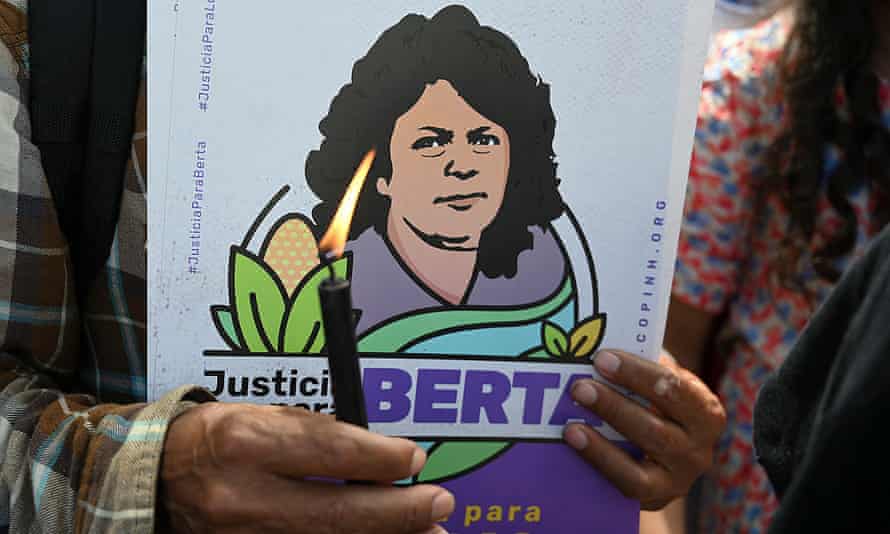
A vigil by the indigenous rights group Copinh at the trial of Roberto David Castillo. Photograph: Orlando Sierra/AFP/Getty
Global development is supported by

Lizzy Davies
Thu 15 Jul 2021 1
When Bertha Zuñiga heard that a former Honduran army intelligence officer and businessman had been found guilty of collaborating in the murder of her mother, Berta Cáceres, she breathed a big sigh of relief. Five years after the environmental campaigner was assassinated by hired hitmen, this was the verdict her family and friends had been waiting for.
“I know there is still a long road, maybe very long and very hard, but to have achieved a guilty verdict against the [former] president of a corporation, [who is] connected to the armed forces: it is unprecedented in our country,” says Zuñiga, 30.
For her, last week’s conviction of Roberto David Castillo, the former head of the hydroelectric company Desarrollos Energéticos, or Desa, as a co-conspirator in the murder sends a clear message “of hope in a country of so much impunity and so much violence”.
Global development is supported by

Lizzy Davies
Thu 15 Jul 2021 1
When Bertha Zuñiga heard that a former Honduran army intelligence officer and businessman had been found guilty of collaborating in the murder of her mother, Berta Cáceres, she breathed a big sigh of relief. Five years after the environmental campaigner was assassinated by hired hitmen, this was the verdict her family and friends had been waiting for.
“I know there is still a long road, maybe very long and very hard, but to have achieved a guilty verdict against the [former] president of a corporation, [who is] connected to the armed forces: it is unprecedented in our country,” says Zuñiga, 30.
For her, last week’s conviction of Roberto David Castillo, the former head of the hydroelectric company Desarrollos Energéticos, or Desa, as a co-conspirator in the murder sends a clear message “of hope in a country of so much impunity and so much violence”.
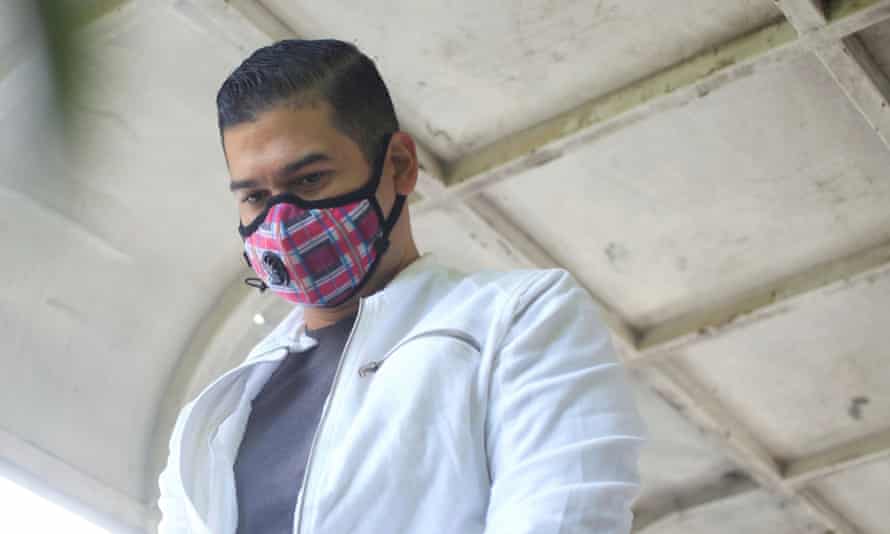
Roberto David Castillo, former head of the Desa hydroelectric company, was found to have used paid informants and his military contacts to monitor Berta Cáceres for years. Photograph: Fredy Rodriguez/Reuters
But the fact that the message was needed shows how much work there is yet to do in a country regularly cited among the most dangerous places in the world to be an environmental or land defender.
“We have to continue the fight,”says Zuñiga, who took over her mother’s role as general coordinator of the indigenous rights organisation Copinh. “Our work, our struggle for justice in the case of our mother, will contribute to this important cause of ensuring there is no repetition of this kind of crime in our country.”
To have achieved a guilty verdict against the former president of a corporation is unprecedented in HondurasBertha Zuñiga
The murder of Cáceres in March 2016 briefly focused international attention on the situation in Honduras. The 45-year-old was killed after spending years opposing the construction of a hydroelectric dam in an area of western Honduras deemed sacred to the Lenca people.
But, despite the global outrage, there has been no improvement in the plight of Honduran activists, who complain of facing intimidation, ranging from harassment and smear campaigns to death threats and illegal detention. According to a new analysis, the number of incidents involving female human rights defenders rose from 203 in 2016 to 475 in 2017.
The research by IM-Defensoras, an organisation representing female rights defenders in Central America, found seven other women who were engaged in similar struggles had been killed. There had also been 34 attempted murders since 2016, it found. That figure dwarfs those from Guatemala, El Salvador, Mexico and Nicaragua. Between 2016 and 2019, 48% of all incidents targeting female defenders in the region occurred in Honduras.
Lydia Alpízar, co-director of IM-Defensoras, said the data painted a clear picture of Honduras as a place whereenvironmentalists were at high risk, even by the standards of the troubled region. Activists say that since the 2009 coup, when the military deposed the leftwing president Manuel Zelaya, the state has worked hand in hand with big industrial companies to pursue environmentally destructive projects, with scant regard for the rights of indigenous people.
But the fact that the message was needed shows how much work there is yet to do in a country regularly cited among the most dangerous places in the world to be an environmental or land defender.
“We have to continue the fight,”says Zuñiga, who took over her mother’s role as general coordinator of the indigenous rights organisation Copinh. “Our work, our struggle for justice in the case of our mother, will contribute to this important cause of ensuring there is no repetition of this kind of crime in our country.”
To have achieved a guilty verdict against the former president of a corporation is unprecedented in HondurasBertha Zuñiga
The murder of Cáceres in March 2016 briefly focused international attention on the situation in Honduras. The 45-year-old was killed after spending years opposing the construction of a hydroelectric dam in an area of western Honduras deemed sacred to the Lenca people.
But, despite the global outrage, there has been no improvement in the plight of Honduran activists, who complain of facing intimidation, ranging from harassment and smear campaigns to death threats and illegal detention. According to a new analysis, the number of incidents involving female human rights defenders rose from 203 in 2016 to 475 in 2017.
The research by IM-Defensoras, an organisation representing female rights defenders in Central America, found seven other women who were engaged in similar struggles had been killed. There had also been 34 attempted murders since 2016, it found. That figure dwarfs those from Guatemala, El Salvador, Mexico and Nicaragua. Between 2016 and 2019, 48% of all incidents targeting female defenders in the region occurred in Honduras.
Lydia Alpízar, co-director of IM-Defensoras, said the data painted a clear picture of Honduras as a place whereenvironmentalists were at high risk, even by the standards of the troubled region. Activists say that since the 2009 coup, when the military deposed the leftwing president Manuel Zelaya, the state has worked hand in hand with big industrial companies to pursue environmentally destructive projects, with scant regard for the rights of indigenous people.
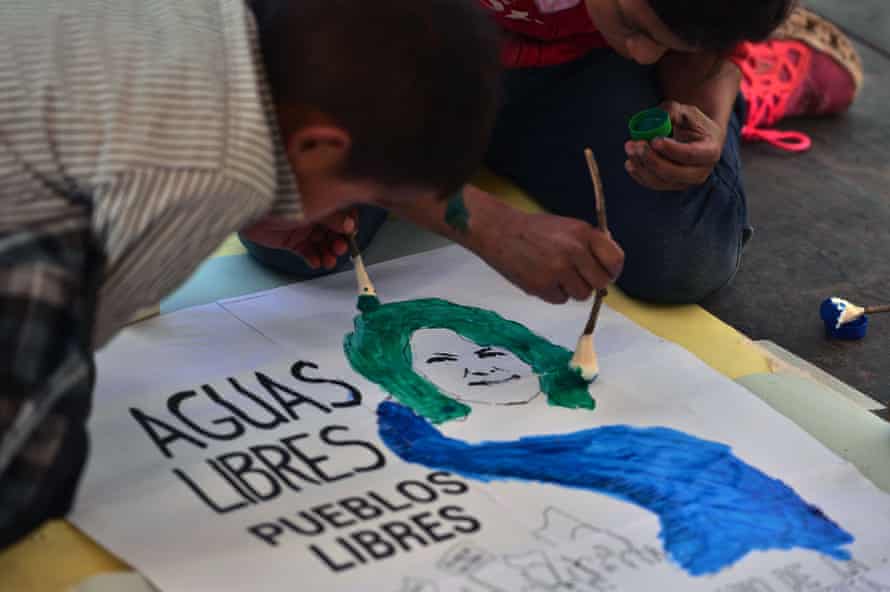
Children paint a sign during a ceremony to commemorate the fourth anniversary of the murder of Berta Cáceres, in La Esperanza, in March last year. Photograph: Orlando Sierra/AFP via Getty Images
“They are protecting their ancestral lands, and they’re in the way, and in the case of Honduras you can see clearly that opposing this model is lethal. You can get killed or criminalised, or pushed from your land,” says Alpízar.
In recent years the black indigenous Garifuna people, who are fighting to save their land from drug traffickers, palm-oil magnates and tourism developers, have been particularly badly hit. Last year five Garifuna fishermen from the town of Triunfo de la Cruz were abducted by armed men in police uniforms and have not been heard of since. At least five women involved with the struggle to protect Garifuna land and culture have been killed since 2019. One of them, María Digna Montero, a teacher, was shot several times at her home on 12 October 2019, known as the Day of Indigenous Resistance to mark the date that Columbus and his fleet landed in the Americas.
“They are protecting their ancestral lands, and they’re in the way, and in the case of Honduras you can see clearly that opposing this model is lethal. You can get killed or criminalised, or pushed from your land,” says Alpízar.
In recent years the black indigenous Garifuna people, who are fighting to save their land from drug traffickers, palm-oil magnates and tourism developers, have been particularly badly hit. Last year five Garifuna fishermen from the town of Triunfo de la Cruz were abducted by armed men in police uniforms and have not been heard of since. At least five women involved with the struggle to protect Garifuna land and culture have been killed since 2019. One of them, María Digna Montero, a teacher, was shot several times at her home on 12 October 2019, known as the Day of Indigenous Resistance to mark the date that Columbus and his fleet landed in the Americas.
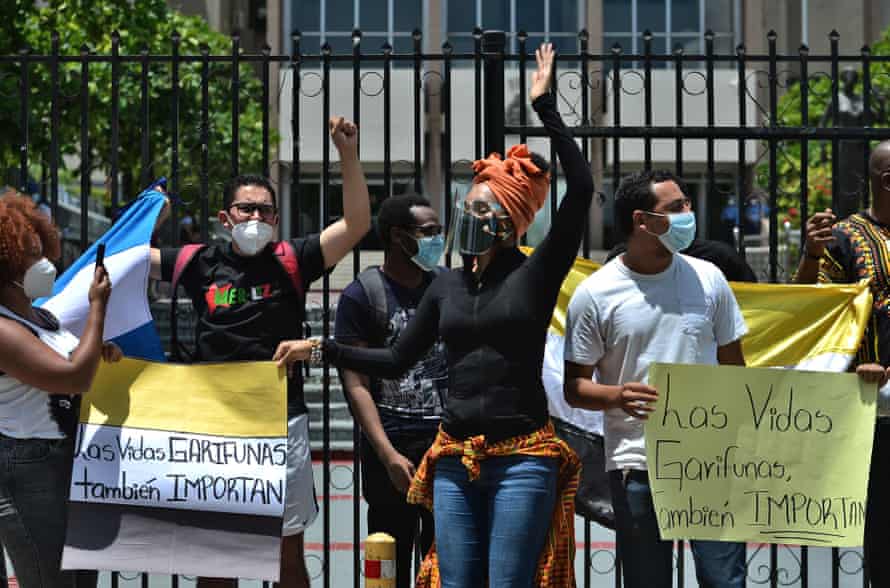
Members of the Garifuna ethnic group outside the supreme court in Tegucigalpa last year protesting at abductions from Triunfo de la Cruz by armed men in police uniform. Photograph: Orlando Sierra/AFP/Getty
Activists say female defenders face different pressures to their male counterparts. Women often find themselves the target of smear campaigns in the local media, and of unwarranted police investigations; they report sexual harassment while in detention. An additional difficulty comes from within their own communities and from their families, who sometimes disapprove of their leadership role, says Alpízar.
Activists say female defenders face different pressures to their male counterparts. Women often find themselves the target of smear campaigns in the local media, and of unwarranted police investigations; they report sexual harassment while in detention. An additional difficulty comes from within their own communities and from their families, who sometimes disapprove of their leadership role, says Alpízar.
Opposing this model [of development] is lethal. You can get killed or criminalised, or pushed from your landLydia Alpízar
“Women who dare to be defenders are completely breaking the traditional gender roles, because women are supposed to be submissive and be in the private sphere. What you’re seeing in so many of these movements … is that women are playing a very crucial role,” says Alpízar.
“And this is important because it means that when they experience violence ... it is actually exemplary violence that is trying to show other women what happens when you take these kinds of leadership roles that are strong, and that are associated with men.”
Defenders hope the conviction of Castillo will send a message that such murders will not go unpunished in future – but they accept that this would signal a big leap from the current situation. Castillo, who is expected to appeal against the verdict, is due to be sentenced next month. Seven other men have already been convicted and sentenced for their roles in the murder.
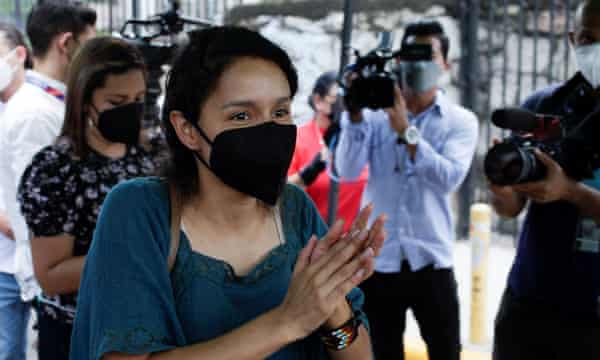
Bertha Zuñiga celebrating after a judge found Roberto David Castillo guilty of collaborating in the 2016 murder of her mother, Berta Cáceres. Photograph: Fredy Rodriguez/Reuters
Zuñiga urges global financial institutions to think carefully before they invest in projects in Honduras. “We need to stop the flow of financing, the flow of resources and international support to corporate actors that are supporting these kinds of criminal behaviours and violations,” she says.
She urged the US president, Joe Biden, to get tough with Juan Orlando Hernández, the Honduran president, arguing that if the US is to succeed in curbing migration from the “northern triangle” of Central America, it must stop supporting regimes “that are violators of human rights”.
Honduras has yet to sign the Escazú agreement, the first environmental human rights treaty in Latin America and the Caribbean, which came into force on 22 April and requires signatories to protect environmental defenders.
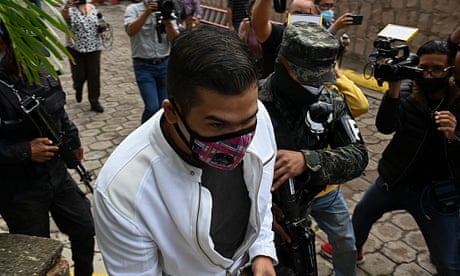
Berta Cáceres assassination: ex-head of dam company found guilty
Read more
Francisca Stuardo, who works for the environmental campaign group Global Witness in Latin America, said moves by the EU to require businesses to conduct due diligence throughout their supply chains were “a huge opportunity” for companies facing accusations of human rights abuses in Honduras to be held accountable.
In March, the European parliament called on the European Commission to propose legislation that would apply not only to companies based in the EU but to those doing business there, obliging them to mitigate against harmful effects in the fields of human rights, environmentalism and governance, and ensure victims of corporate abuse can hold companies liable.
“Honduras is repeating this cycle of violence because no one is being held accountable, because of impunity and also because of a lack of supervision from the international community,” says Stuardo.
“The international community now has a duty [to] support what defenders are looking for, which is nothing more than justice, democracy, a better life, a safe environment.”
Zuñiga urges global financial institutions to think carefully before they invest in projects in Honduras. “We need to stop the flow of financing, the flow of resources and international support to corporate actors that are supporting these kinds of criminal behaviours and violations,” she says.
She urged the US president, Joe Biden, to get tough with Juan Orlando Hernández, the Honduran president, arguing that if the US is to succeed in curbing migration from the “northern triangle” of Central America, it must stop supporting regimes “that are violators of human rights”.
Honduras has yet to sign the Escazú agreement, the first environmental human rights treaty in Latin America and the Caribbean, which came into force on 22 April and requires signatories to protect environmental defenders.

Berta Cáceres assassination: ex-head of dam company found guilty
Read more
Francisca Stuardo, who works for the environmental campaign group Global Witness in Latin America, said moves by the EU to require businesses to conduct due diligence throughout their supply chains were “a huge opportunity” for companies facing accusations of human rights abuses in Honduras to be held accountable.
In March, the European parliament called on the European Commission to propose legislation that would apply not only to companies based in the EU but to those doing business there, obliging them to mitigate against harmful effects in the fields of human rights, environmentalism and governance, and ensure victims of corporate abuse can hold companies liable.
“Honduras is repeating this cycle of violence because no one is being held accountable, because of impunity and also because of a lack of supervision from the international community,” says Stuardo.
“The international community now has a duty [to] support what defenders are looking for, which is nothing more than justice, democracy, a better life, a safe environment.”
No comments:
Post a Comment